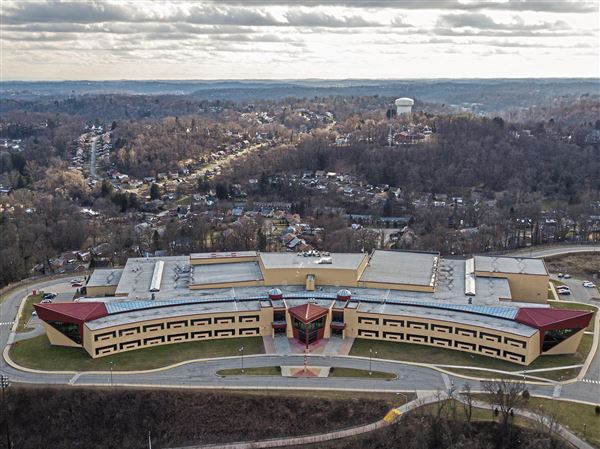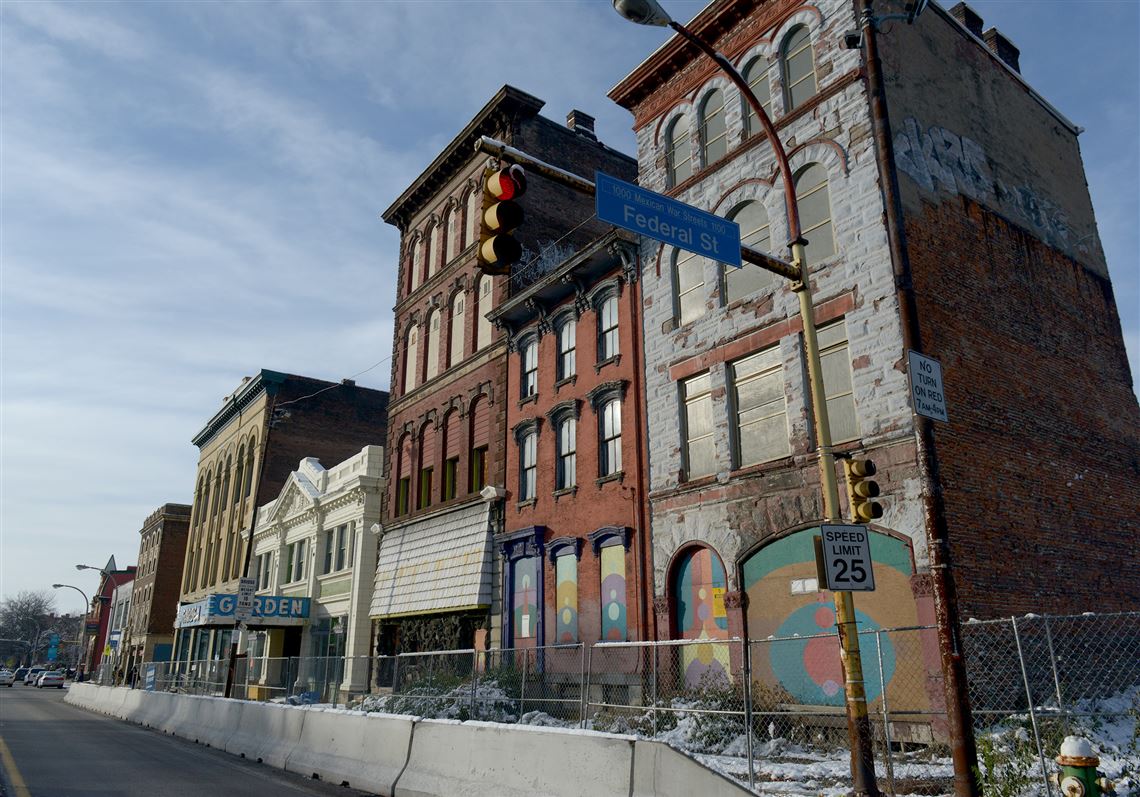North Siders began wondering what in the world was taking the Garden Theater block so long to transform 30 years ago.
Every few years, an editorial would proclaim a new day as one or another proposal took a step forward. But the northwest block of busy North Avenue at Federal Street remained blighted and moribund, even as the rest of the neighborhood was attracting investment.
Since the early ’90s, developers have come and gone. The theater’s closure was the key to progress, but almost 10 years after it closed, only one building, the former Masonic Hall beside it, has the lights on.
Many factors explain what has made this block so problematic. Personality and logistical clashes played a role, but the block is highly idiosyncratic, with just 6,400 square feet of irregularly shaped vacant space amid a chockablock arrangement of seven historic buildings of different sizes and conditions remaining to be redeveloped.
If you go back to the early ’90s, the outlook hung on a lackluster market. Had private developers been interested, the Urban Redevelopment Authority would not have had to assemble all the properties. In trying to buy the Garden Theater, then to take it by eminent domain, the URA was stalled for almost 10 years, six of those in court. The Beaux Arts former movie house, built in 1915, became an adult theater in 1973.
The site also does not fit into a financing category for potential lenders, such as an office building or parking garage, said Kyra Straussman, the URA’s director of real estate. Those are well-defined and predictably analyzed by people who deal with them every day, without the uncertainties of mixed use or whether a wall might crumble.
Then there’s zoning. The site is zoned Local Neighborhood Commercial, which restricts building height to 45 feet, but one building, from the 1880s, is 70 feet tall. Costs per square foot on such a compact site makes height a necessity for a developer to cover costs and satisfy shareholders, Ms. Straussman said.
A Commonwealth Court decision is expected early next year on whether TREK Development Group, working with Q Development, can build an 85-foot-high, eight-story apartment building behind the facades of three historic properties on North Avenue.
The approach got overwhelming neighborhood support, and the Zoning Board of Adjustment approved variances for height and density. Two appellants sought a reversal in Allegheny County Common Pleas Court. Steven Pascal, of Brooklyn, N.Y., now the lone appellant, owns a property nearby. He won in Common Pleas and TREK appealed to Commonwealth.
Architect Ken Doyno said that among numerous design iterations, TREK offered to explore the possibility of six stories, but at that height, construction costs and subsidies would have to increase, and tighter units may be less attractive to renters.
Hope spiked in the neighborhood in 2010. An unprecedented five developers answered a request for proposals. The Central Northside Neighborhood Council and Northside Leadership Conference formed Northside Tomorrow to choose a developer.
The team was soon in conflict over which one to choose. Delays and contentiousness made potential tenants bow out. There were conflicts over water and sewer lines, financing complications and more delays that led to the dismissal of developer Wayne Zukin after he largely had renovated the Garden Theater for a restaurant.
Yet the block has never been further along in its transformation.
The former Masonic Hall is expected to officially open in January as Alphabet City, a cafe, bookstore, performance and workshop space. It is the home of City of Asylum, a non-profit advocate of writers who are persecuted in their own countries.
In January, the URA’s board is expected to approve funding to finish renovations of the Garden Theater and for work to begin on 16 apartments in the Bradberry Building behind Alphabet City.
‘Unrealized potential’
In 1994, all 12 buildings on the block were intact. Deputy Mayor Tom Cox asked Barbara Luderowski, founder of the nearby Mattress Factory Museum, to propose a reuse for them. Her plan sketched out a cultural destination, shops and artists lofts. She invited 13 developers to join her but they turned her down.
The sticking point was the Garden Theater. The common belief was that as long as it showed X-rated films, nothing would be redeveloped around it. After a lengthy court battle, the URA won the right to acquire it by force in 2007 for $1.1 million. The marquee went dark right in time for the 2008 recession.
Kirk Burkley, a leader on the Northside Tomorrow team, said the predominance of old buildings and little potential for parking was a tough sell in 2009.
“The common theme was that it cost too much to fix up these buildings and still get enough in rent, especially with no parking,” he said. “Some people said ‘Tear it down and do stuff like Dunkin Donuts.’ We weren’t willing to accept that.”
In 2010, the Northside Community Development Fund — the Northside Leadership Conference’s financial partner — acquired and earmarked new market tax credits worth $4 million for the project.
Two of the five developers who proposed projects made the cut — Wells & Co. of Spokane, Wash., and Zukin Development Corp. of Philadelphia. The neighborhood chose Wayne Zukin’s company, and the URA granted him exclusive negotiating rights. Several restaurants considered then reconsidered. Piccolo Forno’s chef, Domenic Branduzzi, signed a lease to open a restaurant in the Garden.
The URA agreed to pay for water and sewer improvements, but work was delayed by conflict with PWSA over where the lines should go. After more than a year, Mr. Branduzzi bowed out.
By 2013, the URA began to edge the Zukin team out. He had lost their confidence in his ability to finish, even though the water and sewer work had been a factor in slowing him down. The URA relieved him of three properties that year, of the Masonic Hall in 2014, and by the spring of 2015, he was out of the picture completely.
Mr. Zukin declined to comment for this story.
Next up was TREK Development, which has tackled difficult properties with new construction and preservation. TREK closed on the Garden Theater earlier this year and got exclusive rights to the other undeveloped properties.
TREK’s CEO Bill Gatti said he is committed to making things work, possibly to seek a change in zoning from Local Neighborhood Commercial to Urban Neighborhood Commercial, which allows 85-foot height as a special exception.
“There is so much unrealized potential there,” he said. “These blighted properties at this prominent corner are holding down the value of the neighborhood. We are committed to finding a solution. This corner is too important to be neglected any longer.”
Diana Nelson Jones: djones@post-gazette.com or 412-263-1626.
First Published: December 18, 2016, 5:00 a.m.

















